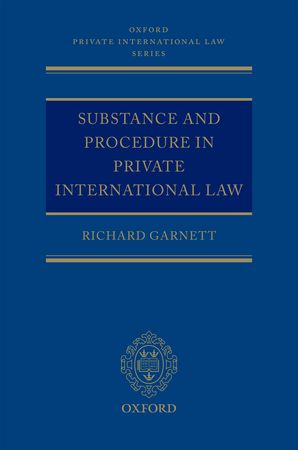New Book: “Substance and Procedure in Private International Law”
 The latest title in the Oxford Private International Law Series has just been published: Substance and Procedure in Private International Law by Professor Richard Garnett.
The latest title in the Oxford Private International Law Series has just been published: Substance and Procedure in Private International Law by Professor Richard Garnett.
The OUP abstract reads:
When the law of a foreign country is selected or pleaded by a claimant or defendant, a question arises as to whether the issue pertains to substance, in which case it may be resolved by foreign law, or procedure, in which case it will be governed by the law of forum. This book examines the distinction between substance and procedure questions in private international law, and analyses where and whether each is appropriate. To do so, it examines previous attempts to define the scope of procedure in private international law, considers alternative choice of law methods for referring matters to the law of forum, and examines the influence of the doctrine of characterization on procedure.
Substance and Procedure in Private International Law also provides detailed analysis of the decisional law in which the substance-procedure distinction has been employed, creating a clear assessment of its application in various practical situations and providing valuable guidance for practitioners on how the distinction should be applied. The book also considers ‘procedural’ topics such as service of process and the taking of evidence abroad, in order to show how the application of forum law may further be limited by foreign laws.
The book:
- Examines the rules governing substance and procedure in private international law to provide a clear and precise delimitation of their function
- Outlines the procedural classification and its importance as a tool within forum law
- Discusses important areas of legal doctrine, such as damages, evidence, and statutes of limitation, to demonstrate the distinctions used
- Provides practical guidance on how the substance-procedure distinction might be applied in future cases
As introductory topics, the book covers the origins, rationale and definition of the substance and procedure distinction, and characterisation, alternative methods of forum reference and harmonization. It then considers specific areas which raise the substance/procedure distinction: service and jurisdiction; parties to litigation; judicial administration; evidence, both general principles and specific issues concerning taking evidence abroad and privilege; statutes of limitation; and remedies, dealing with general principles, non-monetary relief, statutory restrictions, and damages and statutory compensation.
Throughout, the book refers to cases from a variety of jurisdictions, including England, the EU, the USA, Canada, Hong Kong, Singapore, New Zealand and Australia. It is comprehensive in scope, exhaustively researched and clearly written. The book will be of great assistance to any practitioner in the private international law field but is also an academic work of the highest quality. As Sir Anthony Mason, former Chief Justice of the High Court of Australia, concludes in his forward to the book:
This work is not just an admirable statement of the law as it currently stands; it identifies and engages with deeper underlying issues and offers persuasive solutions to them. In addition, it presents a penetrating analysis of the existing rules and the decided cases.
The first chapter is available for free download here.
 The Law School of the Paris Institute of Political Science (Sciences Po) will hold the final meeting of its workshop series for this academic year on
The Law School of the Paris Institute of Political Science (Sciences Po) will hold the final meeting of its workshop series for this academic year on